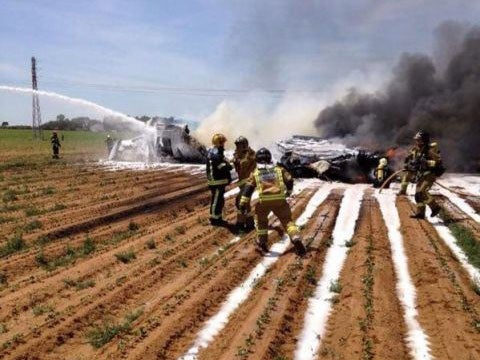Seville plane crash: Software fault could be to blame for disaster
The A400M crashed near Seville on 9 May, killing four of the Airbus crew - two engineers who were also on board survived, and are being treated in hospital

The fly-by-wire technology employed by Airbus has been called into question following a crash in Spain earlier this month involving a military transport plane.
The A400M crashed near Seville on 9 May, killing four of the Airbus crew. Two engineers who were also on board survived, and are being treated in hospital.
The aircraft was on its first test flight prior to delivery to the Turkish Air Force. It is believed that new software to control the aircraft’s fuel supply had been installed, and that a malfunction led to the engines being starved of fuel.
On the Aviation Week website, a former military pilot known as WJLAviator has written: “The real problem with ‘fly by wire’ is that the inter-connectivity of the systems is now so great that it is actually impossible to test all the possible failure modes of the system.”
The loss of Air France flight 447, on a routine passenger flight between Rio and Paris six years ago, was blamed on inappropriate responses by the pilots after the autopilot disconnected. All 228 people on board died when the Airbus A330 stalled and crashed in the Atlantic.
The A400M manufacturer, Airbus Defence and Space, has told all the operators of the type that they must perform checks on the Electronic Control Unit (ECU) on each of the aircraft’s engines before the plane is allowed to fly again. The plane maker has also specified “Additional detailed checks to be carried out in the event of any subsequent engine or ECU replacement.”
After the crash, Spain temporarily withdrew the Airbus licence to operate test flights with aircraft being prepared for delivery. Airbus said: “We are working closely with the military authorities as well as our customers to manage this situation.”
The aircraft, which suffered long delays and heavy cost overruns before entering service, is designed to replace older military transports such as the Hercules.
The first delivery to the UK was in November last year. After the crash in Seville, the RAF grounded the aircraft. It is believed one is on the ground in New Mexico, awaiting permission to fly once again.
Subscribe to Independent Premium to bookmark this article
Want to bookmark your favourite articles and stories to read or reference later? Start your Independent Premium subscription today.

Join our commenting forum
Join thought-provoking conversations, follow other Independent readers and see their replies